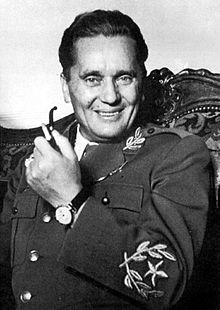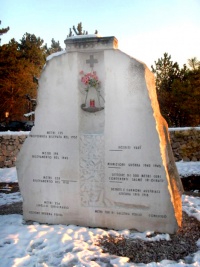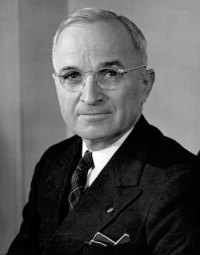Difference between revisions of "Titoism and Totalitarianism"
| Line 157: | Line 157: | ||
*"The '''Commission''' is independent of national governments. Its job is to represent and uphold the interests of the EU as a whole. It drafts proposals for new European laws, which it presents to the European Parliament and the Council. It is also the EU’s executive arm – in other words, it is responsible for implementing the decisions of Parliament and the Council. That means managing the day-to-day business of the [[European Union]]: implementing its policies, running its programmes and spending its funds. Like the Parliament and Council, the European Commission was set up in the 1950s under the EU’s founding treaties."</ref> stated the following: | *"The '''Commission''' is independent of national governments. Its job is to represent and uphold the interests of the EU as a whole. It drafts proposals for new European laws, which it presents to the European Parliament and the Council. It is also the EU’s executive arm – in other words, it is responsible for implementing the decisions of Parliament and the Council. That means managing the day-to-day business of the [[European Union]]: implementing its policies, running its programmes and spending its funds. Like the Parliament and Council, the European Commission was set up in the 1950s under the EU’s founding treaties."</ref> stated the following: | ||
| − | {{quote|'''(a)''' Totalitarian machines: | + | {{quote| |
| + | '''(a)''' Totalitarian machines: | ||
''Let us mention briefly Fascism, National Socialism and Titoism in Italy, Austria and [[Slovenia]]. Three Christian nations, with nationalist tendencies, were infected with totalitarianism. The descent into barbarism has comparable structural elements:'' <ref>[http://www.mp.gov.si/fileadmin/mp.gov.si/pageuploads/2005/PDF/publikacije/Crimes_committed_by_Totalitarian_Regimes.pdf '''European Public Hearing''' on “Crimes Committed by Totalitarian Regimes"] Reports and proceedings of the 8 April European public hearing on “Crimes committed | ''Let us mention briefly Fascism, National Socialism and Titoism in Italy, Austria and [[Slovenia]]. Three Christian nations, with nationalist tendencies, were infected with totalitarianism. The descent into barbarism has comparable structural elements:'' <ref>[http://www.mp.gov.si/fileadmin/mp.gov.si/pageuploads/2005/PDF/publikacije/Crimes_committed_by_Totalitarian_Regimes.pdf '''European Public Hearing''' on “Crimes Committed by Totalitarian Regimes"] Reports and proceedings of the 8 April European public hearing on “Crimes committed | ||
| Line 179: | Line 180: | ||
*Aggressive assumption of power and struggle for territory. (page 197)}} | *Aggressive assumption of power and struggle for territory. (page 197)}} | ||
| − | {{quote|'''(b)''' Mass killings without court trials:<ref>[http://books.google.com.au/books?id=qMZaPjrHqYYC&pg=PA283&dq=josip+broz+tito&hl=en&ei=BGf-S66gBMWrcc3wnZcK&sa=X&oi=book_result&ct=result&resnum=5&ved=0CDkQ6AEwBDge#v=onepage&q=josip%20broz%20tito&f=false Balkan Strongmen:] Dictators and Authoritarian Rulers of South Eastern Europe ''by'' Bernd Jurgen Fischer. (p283)</ref> | + | {{quote| |
| + | '''(b)''' Mass killings without court trials:<ref>[http://books.google.com.au/books?id=qMZaPjrHqYYC&pg=PA283&dq=josip+broz+tito&hl=en&ei=BGf-S66gBMWrcc3wnZcK&sa=X&oi=book_result&ct=result&resnum=5&ved=0CDkQ6AEwBDge#v=onepage&q=josip%20broz%20tito&f=false Balkan Strongmen:] Dictators and Authoritarian Rulers of South Eastern Europe ''by'' Bernd Jurgen Fischer. (p283)</ref> | ||
''The Main Headquarters of the Yugoslav Army had already called attention to respecting the ''Geneva Convention'' on 3rd of May in its order on the treatment of prisoners of war. However, despite this injunction, both prisoners of war and civilians were killed on mass at the end of May and in the first half of June 1945 in Slovenia. Tito’s telegram on respecting the Geneva Convention was later revoked; however, it could only be revoked by the person who issued it in the first place, i.e. Tito himself.''<ref> [http://www.mp.gov.si/fileadmin/mp.gov.si/pageuploads/2005/PDF/publikacije/Crimes_committed_by_Totalitarian_Regimes.pdf '''European Public Hearing''' on “Crimes Committed by Totalitarian Regimes"] Ref: Milko Mikola Crimes Committed by Totalitarian Regimes. Chapter 3. Mass killings without court trials | ''The Main Headquarters of the Yugoslav Army had already called attention to respecting the ''Geneva Convention'' on 3rd of May in its order on the treatment of prisoners of war. However, despite this injunction, both prisoners of war and civilians were killed on mass at the end of May and in the first half of June 1945 in Slovenia. Tito’s telegram on respecting the Geneva Convention was later revoked; however, it could only be revoked by the person who issued it in the first place, i.e. Tito himself.''<ref> [http://www.mp.gov.si/fileadmin/mp.gov.si/pageuploads/2005/PDF/publikacije/Crimes_committed_by_Totalitarian_Regimes.pdf '''European Public Hearing''' on “Crimes Committed by Totalitarian Regimes"] Ref: Milko Mikola Crimes Committed by Totalitarian Regimes. Chapter 3. Mass killings without court trials | ||
(p163).</ref> (page 163.)}} | (p163).</ref> (page 163.)}} | ||
| − | {{quote|'''(c)''' ''Mystifying the crimes of the occupiers, Titoism covered its own crimes. The taboo to hide the crimes of Titoism was meant to conceal the War-time and post-War murders of civilians and prisoners of war without trials. Their graves were levelled and in Slovenia it was forbidden to talk about their fate. Repressive organs controlled the burials sites and the living were strictly forbidden to mention the victims or the graves. The so-called system of preserving and developing revolutionary heritage was used by the [[Communists|Communist Party]] to implement a monopoly on the truth.'' (page 201.)}} | + | {{quote| |
| + | '''(c)''' ''Mystifying the crimes of the occupiers, Titoism covered its own crimes. The taboo to hide the crimes of Titoism was meant to conceal the War-time and post-War murders of civilians and prisoners of war without trials. Their graves were levelled and in Slovenia it was forbidden to talk about their fate. Repressive organs controlled the burials sites and the living were strictly forbidden to mention the victims or the graves. The so-called system of preserving and developing revolutionary heritage was used by the [[Communists|Communist Party]] to implement a monopoly on the truth.'' (page 201.)}} | ||
[[File:Harry-truman.jpg|thumb|right||200px|'''Harry Truman''' 33rd President of the United States (in office from 1945 to 1953)]] | [[File:Harry-truman.jpg|thumb|right||200px|'''Harry Truman''' 33rd President of the United States (in office from 1945 to 1953)]] | ||
Revision as of 11:47, 13 September 2014
This article is about Titoism, the former Yugoslavia and its relationship with Totalitarianism. Titoism and Totalitarianism [1] are political ideologies that dominated the history of communist Yugoslavia.[2][3][4] Titoism as a ideology emerged after the Tito and Stalin (Soviet Union) split and was named after Josip Broz Tito. A single party, the Communist Party of Yugoslavia and its leader Josip Broz Tito, ruled the country.[5][6][7] It was a Totalitarian political system. Josip Broz was a member of the infamous Soviet Police-NKVD and the Soviet Communist Party. The NKVD executed the rule of terror and political repression in and out of the Soviet Union.[8] Tito and his comrades set up KGB style police units in the former Yugoslavia (UDBA[9][10][11] and OZNA). These organisations conducted political repression on a grand scale.[12][13] The regime relaxed its authoritarian rule [14] from the 1960s onwards, although the former Yugoslavia always remained a totalitarian dictatorship and a single-party state.
Totalitarian Dictatorship and Autocracy by Carl Joachim Friedrich and Zbigniew Brzezinski:
Communist Propaganda & Josip Broz Tito's Cult of Personality within Yugoslavia
The Yugoslav Communist state propaganda machine shared much with the Soviet Union. The Soviet format was imposed and then slightly modified. Tito's cult of personality was no different. [16][17][18] The Yugoslav Communist state used youth indoctrination (Union of Pioneers of Yugoslavia), which were all too similar to the Soviet Union (Young Pioneer of the Soviet Union) and the People's Republic of China.
Communist political, historical and philosophical courses were all part of general education. [19] They can be found in any Yugoslav primary school textbook from the 1970s. Encyclopaedias were written in the same style as the Great Soviet Encyclopedia.[20] They were used as a propaganda weapon to show the superiority of Titoism and the Socialist Yugoslavia to other societies and political systems.[21]
Media and arts were used as a powerful means of propaganda [22] and were all placed under heavy censorship.[23][24] Josip Broz Tito was the main subject. Images, monuments, towns, street names, endless awards were given and a never ending production of books, films and poetry [25] were created. Financially a huge amount of resources were used to keep the Communist propaganda and political activities running on a daily basis. [26][27]
Josip Broz’s images, monuments, town names and street names are being removed. This started after the fall of the Berlin Wall and after the break up of Yugoslavia.
Ethnic cleansing, Post-World War Two Camps & Communist Concentration Camps in Yugoslavia
Ethnic cleansing of Germans [28][29][30] and Italians (Foibe massacres),[31][32][33][34][35] were carried out in Yugoslavia. Along the Dalmatian coast Italian (i.e Zadar) was spoken for a millennium, [36][37][38][39][40][41] this was no longer the case after 1945/46. In 1946 the Yugoslav Camps [42][43][44][45] held 117 485 folksdojcera (58 821 women, 32 214 men & 24 422 children).[46]
-See below-
- Note A. Vladimir Geiger of the Croatian Institute for History:
- Note B. Information from the Genocide and Crimes Against Humanity-Yugoslavia by Ed. Dinah L. Shelton. Gale Cengage, 2005:
- Note C. Information below is referenced from the Hrcak Portal of Scientific Journals of Croatia. The Scientific Journal in question is: "An Addition to the Research of the Problem of Bleiburg and Way of the Cross" written by Zravko Dizdar. Zdravko Dizdar is a Croatian Historian from the Croatian Institute for History in Zagreb. Statement in Croatian from Mr Dizdar's Scientific Journal: "Tako je 18. I. 1946. u jugoslavenskimlogorima bilo 117.485 folksdojcera (58.821 žena, 34.214 muškaraca i 24.422 djece)" (Document page 182/pdf page 66.) Transated: ......
Information on the journal:
(More info on Mr Dizdar's Scientific Journal in English: Hrcak Portal of Scientific Journals of Croatia - Link by Mr Zdravko Dizdar - Link)
The Communist regime of Yugoslavia after Second World War engaged in moving large ethnic populations from its territory (a similar policy was being executed by the Soviet Union in Eastern Europe). This would explain the women and children in the camps.
In Dizdar's Scientific Journal it further states that 10,621 POWs died in the camps. He claims to have referenced this information from government documents of the day (Dizdar's Scientific Journal:page 183/pdf page 67).
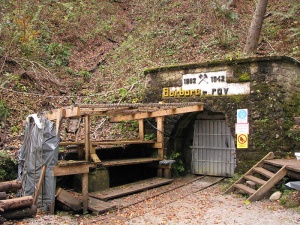
- Note D. Below referenced information (Survey of concentration camps in Yugoslavia-Slovenia in 1945) from European Public Hearing on: “Crimes Committed by Totalitarian Regimes". The European Public Hearing was organised by the Slovenian Presidency of the Council of the European Union (January–June 2008) and the European Commission.
Survey of concentration camps in Yugoslavia (Slovenia) in 1945
Concentration camps for members of the German national minority:
- Strnisce near Ptuj
- Hrastovec near Sv. Lenart in Slovenske Gorice
- Studenci near Maribor
- Brestrnica near Maribor
- Kamnica near Maribor
- Tezno near Maribor
- Teharje near Celje
Concentration camps for members of the Hungarians national minority:
- Filovci in Prekmurje
- Hrastovec near Sv. Lenart in Slovenske Gorice
- Strnisce near Ptuj
Concentration camps for members of the Slovenian Home-Guard:
- Teharje near Celje
- Skofovi zavodi in St. Vid nad Ljubljano
- Skofja Loka (p.154)
Quotes from the document itself:
European EU's press releases concerning: European Public Hearing on: Crimes Committed by Totalitarian Regimes/Brussels - Link

Commission on Concealed Mass Graves in Slovenia
The Government of the Republic of Slovenia (a former republic of Yugoslavia) created "Commission on Concealed Mass Graves in Slovenia" in 2005. In October 2009 they issued their report to the Government of Slovenia. Significant factual statements came to light, concerning Yugoslavia in the aftermath of Second World War. The Jutarnji newspaper reported on the 01/10/2009 commissions find, in all it is estimated that there are 100 000 victims in 581 mass graves.[51] According to the Reports and Proceedings of the 8th of April European public hearing on “Crimes Committed by Totalitarian Regimes" the killings were executed by the Yugoslav Paritsian Army in 1945 and 1946. There was a large scale execution of people that were, guilty by association only and no trials.
Barbarin Rov is one of the many sites. Investigation of the site began August 2008. They found around 350 unidentified bodies. The victims, among were also women [52] who were stripped naked before being killed. By November 2009, 726 bodies where removed from the site. In Tezno, a district of Slovenia's city Maribor, the remains of thousands of victims of purges were found.[53] Kocevski Rog and Huda Jama are other sites where thousands of people were executed. [54]
Encyclopaedia Britannica:
The British author John Corsellis, who served in Austria with the British Army (Red Cross), has written a historic book of these events, called "Slovenia 1945: Memories of Death and Survival after World War II". [56]
In neighbouring Croatia (a former republic of Yugoslavia) there are similar sites where mass murder was committed by Yugoslav Partisans. [57]
Encyclopaedia Britannica:
Jazovka is a pit that was rediscovered in 1990, after the fall of communism in Croatia. The pit is located in Zumberak and was already locally known. The bodies of of civilians and Croatian soldiers were dumped their during and after the Second World War.
In Mr Dizdar's Scientific Journal [58] he stated, that Josip Broz Tito asked the "Croatian Home Guard" to surrender or face the consequences of not surrendering. After the war ended POWs who did not surrender were slaughter on mass, estimates are about 100 000 victims in total. These were the victims of the notorious Bleiburg massacres and Way of the Cross massacres (Death marches). [59][60][61][62]
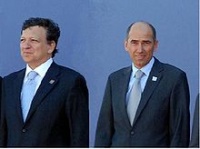
Goli Otok-Prison Gulag of Yugoslavia
Goli Otok (Barren Island), a notorious prison gulag on the Croatian coast (former Yugoslavia’s Gulag). Austro-Hungarian government set up the prison during World War One.
The communist authorities of Yugoslavia in 1949 made into a high-security, top secret prison and labour camp. Until 1956 it was used to incarcerate political prisoners. They included alleged enemies of the communist state, other Communist Party members, regular citizens accused of exhibiting any democratic, anti-communist behaviour and Stalinists. Inmates were regularly beaten and humiliated.[63][64][65][66][67] The prison inmates were forced to do heavy labour in a stone quarry. Other camps that were used by the regime are KPH Zenica, Stare Gradiska and Sveti Grgur.
Assassinations and purges were organised to eliminate individuals who were deemed anti-Yugoslavian or who were publicly critical of communism in Yugoslavia. Noted victims are Bruno Busic, Stjepan Djurekovic and Andrija Hebrang. [68][69] Additionally historian Kerubin Segvic was executed mainly for proposing a different historic model than that of Communist Yugoslav state policies of Croatians arriving in the Western Balkans.[70]
Franjo Tudman who was the first President of Croatia, was sentenced to prison for his political activities in the former Yugoslavia. [71] Janez Jansa the Prime Minister of Slovenia was sentenced to prison for his political activities in the former Yugoslavia. Milovan Djilas a prominent Yugoslav Communist politician, latter theorist and author was imprisoned by the Yugoslav Government for being critical of the regime.[72]
Aleksandar Rankovic
Aleksandar Rankovic, the Interior Minister and the head of the military and secret police of Yugoslavia at a Belgrade Assembly (meeting) stated:
British Government representatives and Yugoslavia
- Frank Waddams a British Government representative who had lived outside of Belgrade, said:
- British Consulate, Ljubljana to British Ambassador Belgrade, 22 August 1947:
European Public Hearing on “Crimes Committed by Totalitarian Regimes" and Yugoslavia
Reports and proceedings of the 8th of April European public hearing on “Crimes Committed by Totalitarian Regimes”,[76] organised by the Slovenian Presidency of the Council of the European Union (January–June 2008) and the European Commission,[77] stated the following:
Harry Truman speaking about Josip Broz Tito
On the 23rd of April in 1948, in a speech Harry S. Truman (the President of USA) stated:
Joze Dezman and Titoism
Joze Dezman (director of the National Museum of Contemporary History in Ljubljana, Slovenia) described the fundamental characteristics of the post-Second World War crimes:
The Slovenia Times
Below is taken from The Slovenia Times article "Naming Street After Tito Unconstitutional":
Paul Hollander
Paul Hollander (Paul Hollander is professor emeritus of sociology at the University of Massachusetts at Amherst and an associate at the Davis Center for Russian and Eurasian Studies of Harvard University):
Media
- New York Times: Evolution in Europe; Piles of Bones in Yugoslavia Point to Partisan Massacres.
- Independent.co.uk World/Europe.The Massacre That Haunts Slovenia
- BBC News: Italy-Croatia WWII Massacre Spat.
- Mail Online-Word News: Gassed to Death: 300 victims of Yugoslavia's Communist Regime Found in Mass Grave.
- The Australian: WWII-era mass grave found in Slovenia
- Ian Cuthbertson review of Tito's Ghosts on The Australian (Newspaper) -Balkans Hero with a Bloodthirsty Streak
- China View: Croatia calls for joint investigation of WWII-era mass grave.
- Slovenia Times: Post-war Killings Enter the Bloody History.
- Croatia's-Index Net: Victims of Communist Regimes get Monument in Vodice.
- Newcomers Network: German Mass Grave Sheds New Light on Close of World War Two:
- Croatia's-Javno: Mass Grave Massacre Ordered By Josip Broz Tito.
- Moje Vjest/Sarajevo: On the Island Daksa Exhumed 48 Victims of Communism.
- Press Agency: Columnist Says Silence on Post-War Killings Needs to End (Interview). Ljubljana, 1 April (STA)
- Alenka Puhar, an author who has written extensively about Slovenia's Communist past, has told STA in an interview that post-WWII killings need to be examined and discussed."We need to talk about it and live with it, with this pain," she said.
- EurActiv Network Croatian PM pays tribute to controversial war victims.
- The Telegraph-London UK: Mass grave of 700 people found in Slovenia
See also
- Human Rights
- European Public Hearing on Crimes Committed by Totalitarian Regimes
- Labour Camps and Communist Concentration Camps in Slovenia (a former republic of Yugoslavia)
- Dictator Josip Broz Tito
- Josip Broz Tito, Bishop Alojzije Stepinac and Antonio Perajica
- Wikipedia's bias towards Dictator Josip Broz Tito and Communist Yugoslavia
- Jugoslavija i totalitarni komunizam (in Croatian)
Notes
- The article is mainly based on the report of Reports and proceedings of the 8 April European public hearing on CRIMES COMMITTED BY TOTALITARIAN REGIMES, organised by the Slovenian Presidency of the Council of the European Union (January–June 2008) and the European Commission (2008 ; Bruxelles). Edited by Peter Jambrek. [86] Published by Slovenian Presidency of the Council of the European Union. The European public hearing addresses gross and large scale human rights violations committed during the reign of totalitarian regimes in Europe: cross- national survey of crimes committed and of their remembrance, recognition, redress, and reconciliation. Link
- Encyclopaedia Britannica
- Hrcak Portal of Scientific Journals of Croatia - An Addition to the Research of the Problem of Bleiburg & Way of the Cross by Zdravko Dizdar of the Croatian Institute of History
- BBC 4: Internal Security of the Former Yugoslavia - Mitja Ribicic (interview):
|
|
Notes and References
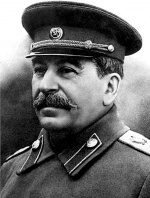
- ^ Dictionary Of Pol. Science by Yadav, Nanda & T.R
- ^ European Public Hearing on “Crimes Committed by Totalitarian Regimes" Reports and proceedings of the 8 April European public hearing on “Crimes committed by totalitarian regimes”, organised by the Slovenian Presidency of the Council of the European Union (January–June 2008) and the European Commission. (p.197)
- ^ Titoism in Action: The Reforms in Yugoslavia After 1948 by Fred Warner Neal. Second chapter (p214)
- "In a totalitarian state, personal freedom and human rights invariably most at the hands of unrestrianed police activity. That Yugoslavia was no exception was admitted by Aleksandar Rankovic, himself head of secret police or State Security Administration. This organization is known in Yugoslavia as UDBA."
- ^ Yugoslavia's Bloody Collapse: Causes, Course and Consequences by Christopher Bennett. (p56)
- "A British journalist who has the good fortune to speak both Slovenian, Croatian and Serbian, a skill that has enabled him to draw heavily on literature of the region that would be unavailable to most American or British journalists."
- ^ The League of Communists of Yugoslavia was the only legal party. Other parties were banned. Read the “CONSTITUTION OF THE SOCIALIST FEDERAL REPUBLIC OF YUGOSLAVIA”, adopted by the Federal People's Assembly April 7, 1963.
- ^ Encyclopaedia Britannica: History & Society-Josip Broz Tito
- ^ BBC-History by Tim Judah
- "Tim Judah is a front line reporter for The Economist and author. A graduate of the London School of Economics and of the Fletcher School of Law and Diplomacy at Tufts University he worked for the BBC before becoming the Balkans correspondent for The Times and The Economist. Judah is also the author of the prize-winning The Serbs: History, Myth and the Destruction of Yugoslavia, published in 1997 by Yale University Press."
- ^ The Florida State University FSU study on three of the 20th century's bloodiest rulers by historian Robert Gellately.
- ^ History of the Literary Cultures of East-Central Europe by Marcel Cornis-Pope & John Neubauer.(p126)
- ^ Australia's Four Corners: UDBA's activities in Australia from the 1960s to 1970s
- ^ Croatians in Australia: pioneers, settlers and their descendants by Ilija Sutalo (The Framed Croatian Six in Australia)
- ^ Transitional justice in Eastern Europe and the former Soviet Union by Lavinia Stan. Chapter 9. (p202).
- "This book provides the most thorough and analytically sophisticated treatment yet available of this crucial topic. Mark Kramer, Cold War Studies Program, Harvard University."
- ^ Great leaders, Great Tyrants Contemporary Views of World Rulers by Arnold Blumberg:
- "Biographical profiles of 52 major world leaders throughout history, written by subject specialists, feature pro/con essays reflecting contemporary views of the creative and tyrannical aspects of their record. They provide librarians, students, and researchers with critical insights into the figure's beliefs, a better understanding of his or her actions, and a more complete reflection on his or her place in history. Coverage is global, from Indira Gandhi to Fidel Castro, and spans history from the Egyptian king Akhenaton to Mikhail Gorbachev. Among the leaders profiled are Otto von Bismarck, Oliver Cromwell, Charles de Gaulle, Elizabeth I, Ho Chi Minh, Lenin, Louis XIV, Mao Zedong, Napoleon I, Kwame Nkrumah, Juan Peron, and Tito. (p312)
- ^ New & Old Wars by Mary Kaldor (p38)
- ^ Totalitarian Dictatorship and Autocracy by Carl Joachim Friedrich & Zbigniew Brzezinski
- ^ Discontents: Post-modern and Post communist’ by Paul Hollander.
- Cult of personality: “Virtually every communist system extinct or surviving at one point or another had a supreme leader who was both extraordinarily powerful and surrounded by a bizarre cult, indeed worship. In the past (or in a more traditional contemporary societies) such as cults were reserved for deities and associated with conventional religious behaviour and institutions. These cults although apparently an intrinsic part of communist dictatorships (at any rate at a stage in their evolution) are largely forgotten today.”
- “ Stalin, Mao, Castro, Ho Chi Minh, Kim Sung, Enver Hoxha, Ceascesu, Dimitrov, Ulbricht, Gottwald, Tito and others all were the object of such cults. The prototypical cult was that of Stalin which was duplicated elsewhere with minor variations. (p377)
- "Paul Hollander Ph.D in Sociology. Princeton University, 1963, B.A. London School of Economics, 1959 Professor Emeritus of Sociology, University of Massachusetts, Amherst Center Associate, Davis Center
- ^ Governing by Committee: Collegial Leadership in Advanced Societies by Thomas A. Baylis. Communist Collective Leadership, (p91)
- ^ Government Leaders, Military Rulers and Political Activists: An Encyclopaedia of People Who Changed the World (Lives & Legacies Series)-By David W. Del Testa, Florence Lemoine & John Strickland/ Legacy Chapter (p181)
- ^ Becoming Slav, Becoming Croat: Identity Transformations in Post-Roman and and Early Medieval Dalmatia by Danijel Dzino (p43)
- "Medieval studies in Croatia and in most of the former Yugoslav space were firmly rooted in political history and suffered from isolationism and lack of interest in foreign scholarship. In the communist era, especially after the 1960s, Marxist ideology and national and Yugoslav political-ideological frameworks strongly impacted on the research into medieval history in Croatia."
- ^ William Benton, (publisher of the Encyclopedia Britannica), stated that concerning the 'Great Soviet Encyclopedia': "about the second edition of the encyclopedia that the encyclopedia had a political bias and claimed that its purpose was a propaganda weapon".
- ^ Democratic transition in Croatia: Value Transformation, Education & Media by Sabrina P. Ramet, Davorka Matic Chapter- History Teaching in the Time of Socialist Yugoslavia, (p198)
- ^ The Fragmentation of Yugoslavia: Nationalism and War in the Balkans by Aleksandar Pavkovic (p44)
- ^ A Personality Cult Transformed: The Evolution of Tito’s Image in the Former Yugoslavia 1974 – 2009/Tamara Pavasovic Trost Ph.D. Candidate Department of Sociology Harvard University USA.
- ^ Public Spheres After Socialism by Angela Harutyunyan, Kathrin Horschelmann & Malcolm Miles. (p50)
- ^ Death of the Father: An Anthropology of the end in Political Authority by Di John Borneman.(p152)
- "This international anthropological project is a study of the closure of political authority in the 20th century and consists of a Website, databases of research materials, an audio-visual essay, and a book. Six anthropologists, led by Cornell professor John Borneman, take up the end of an authority crisis that spanned most of this century, 1917-1991, and that crystallized around four state political forms: Fascist Italy, Nazi Germany, Imperial Japan, and the State Socialist regimes of East Germany, Yugoslavia, Romania, and the Soviet Union."
- ^ The Fragmentation of Yugoslavia: Nationalism and War in the Balkans by Aleksandar Pavkovic.(p 47)
- ^ Religious Separation and Political Intolerance in Bosnia and Herzegovina by Mitja Velikonja. Ref/Chapter Integral and Organic Yugoslavism (p192)
- ^ Ethnic Conflict: Causes, Consequences, and Responses by Karl Cordell & Stefan Wolff (p181)
- ^ Taken: A Lament for a Lost Ethnicity by Kathryn Schaeffer Pabst & Douglas Schaeffer Pabst (p16)
- ^ Genocide of the ethnic Germans in Yugoslavia, 1944-1948 by Herbert Prokle Web site
- ^ The Frontiers of Europe by Malcolm Anderson & Eberhard Bort (p77)
- ^ History in Exile: Memory and Identity at the Borders of the Balkans by Pamela Ballinger (p155)
- ^ Refugees in the Age of Total War by Anna Bramwell (p136, read Zara-p137)
- ^ A Tragedy Revealed The Story of the Italian Population of Istria & Dalmatia by Arrigo Petacco. (p12 & read page 81 Zadar/Zara)
- ^ Where the Balkans Begin (The Slovenes in Triest-The Foiba Story) by Bernard Meares:
- "During the early Communist occupation in Trieste, Gorizia and the Littoral, and the 40 days of Communist rule in Trieste city, some 6000 arrests were made and the prisoners carried off to Communist-controlled areas. When the Allies finally imposed their rule they found out about the Yugoslav execution squads. The more objective Italian historians and statisticians such as Galliano Fogar and Raoul Pupo point to between 1000 and 1800 Italians and Slovene victims. The Red Cross estimates that 2,250 failed to return, in rough agreement with Bogdan Novak who said in 1971 that 4200 Italians returned out of 6000 arrested."
- ^ The Italians of Dalmatia: From Italian unification to World War I by Luciano Monzali (p17)
- ^ Dalmatia and Montenegro: With a journey to Mostar in Herzegovina.Volume 1 by Sir John Gardner Wilkinson (p4).
Sir John Gardner Wilkinson (1797 – 1875) was an English traveller, writer and pioneer Egyptologist of the 19th century. He is often referred to as "the Father of British Egyptology".
- Italian is spoken in all the seaports of Dalmatia (editors note: today part of Croatia), but the language of the country is a dialect of the Slavonic, which alone is used by peasants in the interior."
- ^ Dalmatia and Montenegro: With a journey to Mostar in Herzegovina.Volume 1 by Sir John Gardner Wilkinson (p362)
- "Their language though gradually falling into Venetianisms of the other Dalmatians towns, still retains some of that pure Italian idiom, for which was always noted."
- ^ Researches on the Danube and the Adriatic, Volume 1 by Andrew Archibald Paton (1811 - 1874)
Andrew Archibald Paton was a British diplomat and writer from the 19 century. In 1861 he wrote in ; Researches on the Danube and the Adriatic: Or, Contributions to the Modern. This is his statement (p167):
- "...the islands of Dalmatia owe much of their culture to the near vicinity of Venice and the more extensive use of the Italian language..."
- ^ Penny cyclopaedia of the Society for the Diffusion of Useful Knowledge, Volume 8 by Society for the Diffusion of Useful Knowledge (Great Britain).
- "The language of the country is the Herzogovine dialect of the Sclavonian, but Italian is the prevalent tongue among the well-educated classes, and is used in the public offices and courts. The remainder of the population is composed of Italians (about 40 000) who are spread through the maritime towns and the sea coast"
- ^ Dalmatia: The Land Where East Meets West by Maude Holbach (p121)
- "DALMATIA: The Land Where East Meets West is MAUDE M. HOLBACH's second book of travel in Eastern Europe. First published in 1910, this is an anthropological travel journal of an often-overlooked kingdom" Web site: www.cosimobooks.com
- "Two hundred years later that, is, early in the tenth century you might have heard Slavish and Latin spoken had you walked in the streets of Ragusa (Dubrovnik), just as you hear Slavish and Italian today; for as times of peace followed times of war, the Greek and Roman inhabitants of Rausium intermarried with the surrounding Slavs, and so a mixed race sprang up, a people apart from the rest of Dalmatia"
- ^ European Public Hearing on “Crimes Committed by Totalitarian Regimes" Milko Mikola: COMMUNIST CONCENTRATION CAMPS AND LABOUR CAMPS IN SLOVENIA (p154)
- ^ Transitional justice in Eastern Europe and the former Soviet Union by Lavinia Stan. Chapter 9. (p201,p202)
- ^ Comrades- A History of World Communism by Robert Service (p252)
- ^ The Three Yugoslavias: State-Building and Legitimation, 1918-2005 by Sabrina P. Ramet (p159)
- ^ Hrcak Portal of Scientific Journals of Croatia by Mr Dizdar's Scientific Journal - An Addition to the Research of the Problem of Bleiburg & Way of the Cross.pdf page 66/Document page 182. The Scientific Journal is in Croatian: Z. Dizdar: PRILOG ISTRAŽIVANJU PROBLEMA BLEIBURGA I KRIŽNIH PUTOVA (U POVODU 60. OBLJETNICE): Hrvatski institut za povijest HR 10000 Zagreb, Izvorni znanstveni članak Ur.: 2005-12-15 pdf str. 66/dokument str. 182
- ^ Newcomers Network: German Mass Grave Sheds New Light on Close of World War Two.
- ^ M & C News: Feature German mass grave sheds new light on close of World War Two (Feature) By Boris Raseta Feb 17, 2011, 2:06 GMT
- ^ Encyclopedia of Genocide and Crimes Against Humanity, Volume 3 by Dinah Shelton Macmillan Reference, 2005 - Political Science (p.1170)
- ^ www.enotes.com "Yugoslavia." Genocide and Crimes Against Humanity. Ed. Dinah L. Shelton. Gale Cengage, 2005. eNotes.com. 2006. 26 Jun, 2010 Yugoslavia: Genocide & Crimes Against Humanity-Mark Thompson.
- ^ www.jutarnji.hr U 581 Grobnici je 100.000 žrtava. English version-The Jutarnji newspaper reported on the 01/10/2009 commissions find, in all it is estimated that there are 100 000 victims in 581 mass graves
- ^ Identity Politics in the Age of Genocide: The Holocaust and Historical by David B. MacDonald. (p168).
- "The Partisans also carried out massacres, best known being at Bleiburg (Austria), where retreating Croatian and Slovenian forces and their families were massacred."
- ^ Forgotten Victims-Slovenian Mass Grave Could Be Europe's Killing Fields Spiegel Online 2007
- ^ www.independent.co.uk The Independent-World/Europe.The Massacre That Haunts Slovenia.
- ^ Encyclopaedia Britannica: Slovenia
- ^ Slovenia 1945: Memories of Death and Survival after World War II by John Corsellis & Marcus Ferrar. (p87, p204 & p250).
- ^ Encyclopaedia Britannica: Croatia
- ^ Hrcak Portal of Scientific Journals of Croatia by Mr Dizdar's Scientific Journal - An Addition to the Research of the Problem of Bleiburg & Way of the Cross.
- ^ Encyclopaedia Britannica: Partisan (Yugoslavian military force)
- ^ BBC-History Partisans: War in the Balkans 1941-1945. Dr Stephen A Hart is senior lecturer in war studies at the Royal Military Academy Sandhurst. He is the author of The Road to Falaise: Operations "Totalize" & "Tractable" (Alan Sutton, 2004), "Montgomery " and "Colossal Cracks": The 21st Army Group in Northwest Europe, 1944-45 (Praeger, 2000).
- "Murder, rape and mass executions were all too common in Yugoslavia during World War Two - carried out by Partisan fighters as well as by Chetnik rebels and German troops." Link
- ^ Yalta and The Bleiburg Tragedy by C Michael McAdams/University of San Francisco, California-USA. Presented at the International Symposium for Investigation of the Bleiburg Tragedy Zagreb, Croatia and Bleiburg, Austria May 17 and 18, 1994.
- ^ Croatians: Webster's Quotations, Facts and Phrases by Inc Icon Group International
- ^ The Three Yugoslavias: State-building and Legitimation, 1918-2005 by Sabrina P. Ramet. (p377).
- ^ Discontents: Postmodern and Postcommunist] by Paul Hollander. (p397)
- ^ Goli Otok: Yugoslavia’s Evil Island Gulag Josip Zoretic-Political prisoner of the former Yugoslavia's most notorious prison. Goli Otok: Hell in the Adriatic (book) by Josip Zoretic
- ^ Vera Winter– Croatian Economist. Political prisoner of the former Yugoslavia's prison, Goli Otok. Interview: BBC 4/Tito's Ghosts
- ^ Alfred Pal- Croatian Artist. Political prisoner of the former Yugoslavia's prison, Goli Otok. Interview: BBC 4/Tito's Ghosts
- ^ Assassinations Commissioned by Belgrade: Documentation about the Belgrade by Hans Peter Rullmann (p62,p71)
- ^ Amnesty International Report, 1984 by Amnesty International. In July Stjepan Djurekovic, a Croatian emigre was shot dead, near Munich in Germany. Amnesty International received allegations that he had been killed by agents of the Yugoslav state security police.
- ^ Becoming Slav, Becoming Croat: Identity Transformations in Post-Roman and Early Medieval Dalmatia by Danijel Dzino (p20)
- ^ The Breakup of Yugoslavia and the War in Bosnia by Carole Rogel (p111)
- ^ The Road to War in Serbia: Trauma and Catharsis by Nebojsa Popov & Drinka Gojkovic (p94)
- ^ Communist Crime is not Antifascism Released on International Human Rights Day, 10 DECEMBER 2008. On behalf of the participants in public meetings Maja Runje, a member of the Steering Committee- Zagreb (p. 19). Article is in Croatian: KOMUNISTIČKI ZLOČINI NISU ANTIFAŠIZAM] POVODOM MEĐUNARODNOG DANA LJUDSKIH PRAVA,10. PROSINCA 2008. U ime sudionika javnog okupljanja Maja Runje, članica Koordinacijskog odbora Kruga za trg10 000 Zagreb, Jurjevska 47a (str. 19)
- ^ Frank Waddams, a British representative in the former Yugoslavia Death by Government by R. J. Rummel.(p354).
- ^ European Public Hearing on Crimes Committed by Totalitarian Regimes by Slovenian Presidency of the Council of the European Union (January–June 2008) and the European Commission- Appendices/Appendix A: Foreign office documents on the 1947 show trial:
- From Foreign Office to Belgrade, 15 August 1947 Waddams, vice-consul Ljubljana 1945, considers he may be the diplomatic representative referred to in the trial, as both Furlan and Sirc were the only people who helped him to get the Ljubljana consulate going when he first opened it. He considers this the probable reason for their sentence. (p143)
- ^ International Law Observer Responding to post-Second World War totalitarian crimes in Slovenia Posted on June 22, 2009 by Jernej Letnar Cernic
- ^ The European Commission:
- "The Commission is independent of national governments. Its job is to represent and uphold the interests of the EU as a whole. It drafts proposals for new European laws, which it presents to the European Parliament and the Council. It is also the EU’s executive arm – in other words, it is responsible for implementing the decisions of Parliament and the Council. That means managing the day-to-day business of the European Union: implementing its policies, running its programmes and spending its funds. Like the Parliament and Council, the European Commission was set up in the 1950s under the EU’s founding treaties."
- ^ European Public Hearing on “Crimes Committed by Totalitarian Regimes" Reports and proceedings of the 8 April European public hearing on “Crimes committed
by totalitarian regimes”, organised by the Slovenian Presidency of the Council of the European Union (January–June 2008) and the European Commission. Page 197. Joze Dezman:
COMMUNIST REPRESSION AND TRANSITIONAL JUSTICE IN SLOVENIA
Additional chapter: COMMUNIST REPRESSION Of “INTERIOR ENEMIES” IN SLOVENIA
- "In the greater part of this paper, the author deals with individual repressive measures that Communist rule imposed in Slovenia in the period from the end of the war in 1945 until the beginning of the 1950s. In this period, the Communist authorities in Slovenia implemented all the forms of repression that were typical of states with Stalinist regimes. In Slovenia, it was a time of mass killings without court trials, and of concentration and labour camps."
- "Property was confiscated, inhabitants were expelled from Slovenia/Yugoslavia and their residences, political and show trials were carried out, religion was repressed and the Catholic Church and its clergy were persecuted. At the beginning of the 1950s, Communist rule in Slovenia abandoned these forms of repression but was ready to reapply them if it felt threatened."
- "Thus the regime set up political and show trials against certain more visible opponents later. In the case of an “emergency situation”, even the establishment of concentration camps was planned in Slovenia in 1968, where around 1,000 persons, of whom 10 % were women, would be interned for political reasons." (p161)
- ^ Balkan Strongmen: Dictators and Authoritarian Rulers of South Eastern Europe by Bernd Jurgen Fischer. (p283)
- ^ European Public Hearing on “Crimes Committed by Totalitarian Regimes" Ref: Milko Mikola Crimes Committed by Totalitarian Regimes. Chapter 3. Mass killings without court trials (p163).
- ^ Keeping Tito Afloat by Lorraine M. Lees:
- "Tito Afloat draws upon newly declassified documents.The book offers a history of US relations with Yugoslavia from 1948 to 1960. It utilizes diverse sources including personal interviews with the key US and Yugoslav officials and the papers of George F. Kennan and John Foster Dulles. It shows the critical role that Yugoslavia played in U.S. foreign policy with the communist world in the early years of the Cold War. After World War II, the United States considered Yugoslavia to be a loyal Soviet satellite, but Tito surprised the West in 1948 by breaking with Stalin. Seizing this opportunity, the Truman administration sought to "keep Tito afloat" by giving him military and economic aid." (p47)
- ^ Woodrow Wilson and Harry Truman: Mission and Power in American Foreign Policy by Anne R. Pierce. (p219)
- ^ Slovenian Press Agency-Politics28.02.2009 12:00/HISTORY, POLITICS
- ^ The Slovenia Times: Naming Street After Tito Unconstitutional
- ^ http://www.cato.org/publications/development-policy-analysis/reflections-communism-twenty-years-after-fall-berlin-wall
- ^ Council of Europe-Parliamentary Assembly
External links
- EUROPA EU. Press Releases-Brussels for CRIMES COMMITTED BY TOTALITARIAN REGIMES
- Croatian Medical Journal: Identification of Skeletal Remains of Communist Armed Forces Victims During and After World War II
- European Union: The European Commission Link
- Government of the Republic of Slovenia: Commission on Concealed Mass Graves in Slovenia (a former republic of Yugoslavia) Link
- Slovenian Presidency of the EU Council
- National Museum of Contemporary History (Ljubljana) Link
- Croatian Institute of History Link
- BBC 4: Internal Security of the Former Yugoslavia - Mitja Ribicic (Interview).
- BBC 4: Croatian Physicist, Philosopher, Writer, Playwright, Peace Activist Humanist & former Yugoslav Partizan - Ivan Supek (Interview).
(Interviews: Directed by Mira Erdevicki. Combining stunning archive with incisive interviews this documentary charts how every stage of Tito's life has left its mark on the former Yugoslavia/BBC 4:Tito's Ghosts)
- Trail of Tears Leidensweg "the way of sorrows" Genocide & Atrocities Against The Donauscwhwaben "Genocide Carried out by the Tito Partisans 1944-1948"
- Forgotten Genocide FINAL TRAILER.divx
- Slovenia 1945 Book Official Site - Memories of Death and Survival:
Selected as "Book of the Year" 2005 in the Times Literary Supplement by John Bayley, literary critic, retired Oxford University Professor and widower of Iris Murdoch. The authors wrote to Prime Minister Tony Blair asking for Britain to make a gesture of regret to Slovenia for sending back the surrendered soldiers.
Josip Broz Tito Slovenia Wikipedia Josip Broz Tito josip broz tito Dictator Josip Broz Tito Marshall Josip Broz Tito josip broz Tito Titoism Yugoslavia European Union European Commission Communist Yugoslavia Encyclopaedia Britannica BBC Tim Judah European Public Hearing on Crimes Committed by Totalitarian Regimes Commission on Concealed Mass Graves in Slovenia Communist propaganda Joze Dezman Mitja Ferenc Aleksandar Rankovic Mitja Ribicic Simo Dubajic Goli Otok tito Totalitarianism Yugoslavia Yugoslavia Communist Yugoslavia Communists European Public Hearing on Crimes Committed by Totalitarian Regimes Slovenian Presidency of the Council of the European Union European Commission concentration camps in Yugoslavia concentration camps in Slovenia [Keyword:=concentration camps]] Mass killings without court trials
